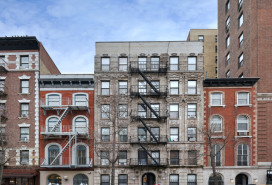Ask an Expert: My co-op needs cash. What's the least painful way to get it?

Q. My co-op building has been hit hard in recent years by property taxes on top of a huge elevator replacement project. Our maintenance charges are already on the high side and we are trying to avoid another increase or an assessment.
Can you suggest some other alternatives for raising money that would be less painful?
For example, one idea that has been suggested is dividing up our undeveloped roof area and selling it to shareholders.
A. You're on the right track, say our experts, who shared some common and not-so-common ways co-ops and condos are building up their coffers nowadays.
"In the past, many co-ops executed longterm leases for antenna roof rights, and while that is still a source of income, the market is somewhat mature," says co-op and condo attorney Dean Roberts of Norris McLaughlin & Marcus.
Instead, he says, see what services your co-op can provide to shareholders, such as developing unused basement space or other areas into storage lockers.
"There are several companies that will provide storage lockers for shareholders, including the complete buildout of the room in exchange for a longterm agreement," says Roberts.
He also advises reviewing any commercial leases your building may have--particularly leases to parking garages in your building.
"Many co-ops have preferred parking deals for shareholders, and most of the time they're substantially below the market rate, so that in essence, shareholders who do not have cars subsidize those who use parking. Raising the rate is a ready source of income."
No garage to leverage? Real estate attorney Jeffrey Reich of Wolf Haldenstein Adler Freeman & Herz says he has seen some co-ops "divide up and sell shares and leases to roof spaces, storage areas and hallway spaces."
Other boards have sought advertising revenue via signage opportunities on the building itself, says Reich, and some are looking into creating amenity spaces--like gyms, media rooms and business renters--that can be rented out on a for-profit basis.
In recent years, flip taxes have been enormously popular--and with the market heating up, a nice source of revenue.
"A flip tax is not really a tax--it's a fee imposed by the co-op and payable at closing," explains real estate broker Shirley Hackel of Warburg Realty. "Flip taxes can range from a flat fee, to a specified dollar amount per share, to a percentage of the gross sales price."
Back in the early 1980’s, when flip taxes were introduced, most were paid by the seller, says Hackel, and they were calculated as a specified percentage of the seller’s profits.
"Today, probably the most commonly imposed transfer fee is 2% of the gross sales price paid by the buyer, though some co-ops like the San Remo are considerably higher at 3.5%," she says. The reason for shifting the burden to buyers is often "that the buyer will benefit more than the seller from these additional funds. When the proprietary lease fails to specify who pays, the flip tax often becomes a negotiable term."
Although many shareholders object to the instituion of a flip tax because it creates higher closing costs, notes real estate broker Deanna Kory of Corcoran, "having a flip tax and a lower maintenance is a far better scenario than having a high maintenance and no flip tax."
To get around shareholders' objections, she says, one building recently passed a flip tax that would only apply to new buyers when they eventually sold their apartments.
Kory also suggests looking into whether your building's underlying mortgage should be refinanced.
"Often times it's overlooked by the board for a number of reasons," she says. But refinancing can lower the maintenance by lowering the monthly mortgage payment or put some extra money in reserve for capital improvements.
Trouble at home? Get your NYC apartment-dweller questions answered by an expert! Send us your questions.






















